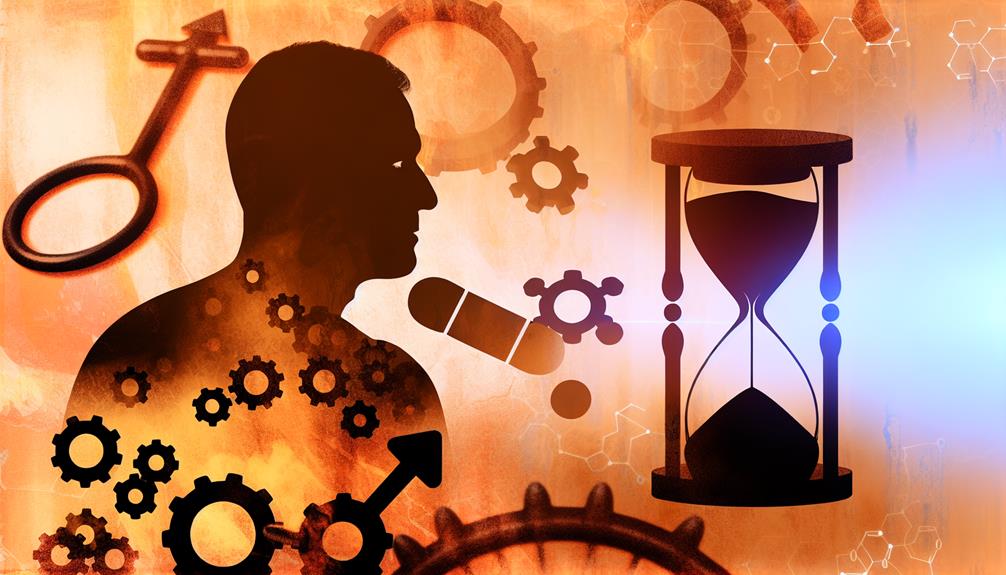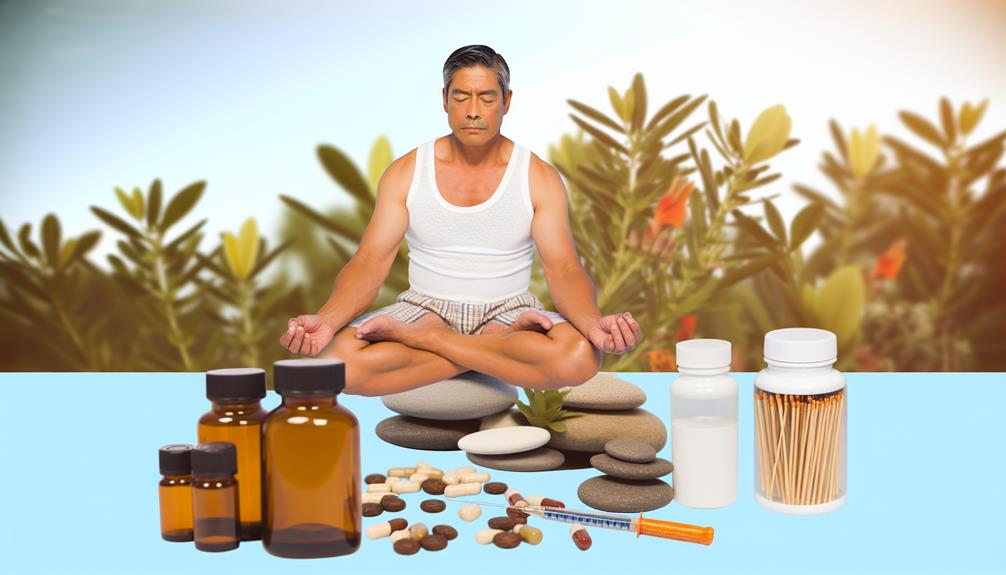Aging impacts testosterone levels markedly, starting around age 30, when they decline roughly 1% per year. This reduction can lead to hypogonadism, affecting muscle mass, libido, and bone density, alongside emotional health. Individuals may experience symptoms like fatigue and mood swings. Factors such as obesity, chronic illness, and lifestyle choices further complicate this hormonal decline. To effectively manage testosterone levels, I recommend regular health check-ups and consultations with healthcare professionals. It's vital to monitor changes and consider potential treatment options for maintaining overall health. There's more to understand about the management of these hormonal fluctuations.
Understanding Testosterone

Testosterone, an indispensable hormone primarily produced in the testes, plays an important role in various physiological processes. It contributes considerably to the development of male characteristics, regulates libido, and maintains muscle mass and bone density. However, as I've explored, testosterone levels can decline with age, leading to a condition known as hypogonadism. This decrease can affect not just physical health but also emotional well-being.
In some cases, individuals may seek testosterone replacement therapy as a solution to mitigate the effects of low testosterone levels. This therapy involves administering testosterone through injections, gels, or patches, aiming to restore hormonal balance. It's essential to understand that while hormone therapy can provide benefits, it isn't without risks. Potential side effects include increased red blood cell count, sleep apnea, and cardiovascular issues. Consequently, it's important to undergo thorough evaluation and monitoring by a healthcare professional before initiating treatment.
Moreover, the decision to pursue testosterone replacement should consider individual symptoms and overall health. I've learned that not everyone with low testosterone levels requires therapy; some may manage their symptoms through lifestyle modifications, such as improved diet and exercise. Ultimately, understanding testosterone's role and the implications of hormone therapy is crucial for making informed decisions regarding one's health. It's a nuanced journey that demands careful consideration and professional guidance.
Testosterone Levels by Age
As I explore testosterone levels by age, it's essential to recognize the normal decline that occurs as we grow older. This decline is not merely a coincidence; it's closely linked to age-related hormonal changes that affect various physiological functions. Understanding these patterns can help us grasp the broader implications of aging on men's health.
Normal Testosterone Decline
Many people might not realize that testosterone levels naturally decline with age, a phenomenon that can considerably impact overall health and well-being. As I explore the normal testosterone decline, it's critical to understand that this isn't just a myth; it's a biological reality. Research indicates that, on average, testosterone levels drop approximately 1% each year after the age of 30.
What's often overlooked are the implications of this decline on hormonal balance. Lower testosterone can affect mood, energy levels, and even muscle mass, leading to a cascade of health issues. Unfortunately, testosterone myths abound, suggesting that low testosterone is solely a problem of aging or that it can be easily remedied with supplements.
In truth, maintaining hormonal balance is complex and requires understanding individual health factors. It's essential to approach this decline with a nuanced perspective, considering lifestyle, diet, and overall health. Rather than succumbing to misconceptions, I encourage a proactive strategy that includes regular health check-ups and informed discussions with healthcare providers to navigate this natural aging process effectively.
Age-Related Hormonal Changes
Understanding age-related hormonal changes is vital for grasping how testosterone levels fluctuate throughout life. As I explore this topic, I recognize that the endocrine system plays a central role in maintaining hormonal balance, particularly with testosterone. Research indicates that testosterone levels peak in early adulthood—typically around the late teens to early twenties. After this peak, there's a gradual decline, averaging about 1% per year after the age of 30.
This decline isn't uniform for everyone; factors such as genetics, lifestyle choices, and overall health can greatly influence individual testosterone levels. For instance, obesity and chronic illnesses can exacerbate hormonal imbalances, further accelerating testosterone depletion.
Moreover, the interplay between testosterone and other hormones, like estrogen and cortisol, becomes increasingly complex with age. As testosterone diminishes, changes in mood, energy levels, and physical health often manifest, highlighting the importance of maintaining hormonal balance throughout the aging process. Understanding these age-related hormonal changes is essential for developing targeted strategies to support health and well-being as we age. Consequently, monitoring testosterone levels becomes a valuable aspect of preventive healthcare.
Signs of Low Testosterone

I've observed that low testosterone can manifest through various physical symptoms, emotional changes, and mental effects. It's essential for individuals to recognize these signs early, as they can greatly impact overall well-being. Diagnostic testing methods are available to confirm low testosterone levels, paving the way for appropriate interventions.
Physical Symptoms to Observe
A notable decline in testosterone levels can manifest through various physical symptoms that are vital to recognize. One of the most common indicators I've observed is the emergence of fatigue patterns that deviate from what I once considered normal. This isn't just typical tiredness; it's a pervasive fatigue that can linger throughout the day, impacting my energy levels and overall motivation.
Additionally, I've noticed changes in my body composition, including increased fat accumulation, particularly around the abdomen, while muscle mass seems to diminish despite regular exercise. This shift can be disheartening as it often feels like I'm putting in effort without seeing the corresponding results.
Another physical symptom worth noting is the decrease in libido, which can greatly affect quality of life. Moreover, I've encountered unexpected mood fluctuations, ranging from irritability to a sense of apathy. These fluctuations can be perplexing, as they seem to arise without clear triggers and can contribute to an overall sense of dissatisfaction.
Recognizing these symptoms is essential, as they may indicate underlying hormonal changes that warrant further investigation. Monitoring these signs may lead to timely interventions, improving overall well-being.
Emotional and Mental Effects
Low testosterone levels can greatly influence emotional and mental well-being, often manifesting in subtle yet impactful ways. As I've explored this connection, I've noticed that individuals may experience increased irritability, anxiety, or even depressive symptoms. This emotional turbulence often stems from hormonal imbalances that affect neurotransmitter functions, leading to a diminished sense of well-being.
In my observations, low testosterone can lead to cognitive decline, manifesting as difficulties in concentration and memory retention. These mental health challenges can markedly impair daily functioning and quality of life. It's essential to recognize that these symptoms aren't merely a byproduct of aging; they can be directly linked to hormonal shifts.
For those facing these emotional hurdles, testosterone therapy has emerged as a potential intervention. It may not only restore hormonal balance but also positively impact mental health outcomes. Many report improvements in mood, motivation, and cognitive clarity following treatment. Ultimately, understanding the emotional and mental effects of low testosterone is vital, allowing individuals to seek appropriate care and regain their emotional stability.
Diagnostic Testing Methods
Recognizing the signs of low testosterone is essential for timely diagnosis and intervention. When I assess a patient for potential testosterone deficiency, I utilize a combination of diagnostic methods. Blood tests are the gold standard, particularly serum testosterone measurements through hormone assays. These tests must adhere to established laboratory standards to guarantee accuracy.
In line with clinical guidelines, I consider age considerations; testosterone levels naturally decline with age, affecting diagnostic criteria. I often recommend testing frequency based on initial results and patient evaluation—typically, I suggest retesting if initial levels are borderline low or if symptoms persist.
Saliva testing is an alternative, though less commonly used, and can provide insight into free testosterone levels. However, it's essential to approach this method with caution due to variability in results.
Throughout the process, I emphasize symptom assessment, as clinical presentations can vary widely. Symptoms like fatigue, reduced libido, and mood changes can guide my diagnostic approach. Ultimately, a thorough evaluation, integrating laboratory results with clinical symptoms, is critical to developing an effective treatment strategy for low testosterone.
Causes of Decline
Various factors contribute to the decline in testosterone levels as men age, with hormonal changes being a primary driver. As I've observed, lifestyle factors play a notable role in this decline. Poor dietary choices and sedentary behavior can lead to nutritional deficiencies and obesity, which greatly impact hormone production. Obesity, in particular, is associated with increased estrogen levels and decreased testosterone, creating a cycle of hormonal imbalances that can exacerbate the issue.
Genetic predisposition is another factor that can't be overlooked. Some men may naturally have lower testosterone levels due to hereditary traits. Additionally, environmental influences, such as exposure to endocrine disruptors, can alter hormonal balance and lead to declines in testosterone.
Chronic illnesses, including diabetes and cardiovascular diseases, also contribute to lower testosterone. These conditions can create a cascade of physiological changes that further affect hormone production. Medication effects cannot be ignored either; certain drugs may inhibit testosterone synthesis or its action in the body.
Furthermore, stress levels profoundly influence testosterone. Chronic stress elevates cortisol, which can suppress testosterone production. Sleep patterns are equally important; inadequate sleep disrupts the body's hormonal rhythm, leading to reduced testosterone levels.
Ultimately, understanding these causes provides insight into how aging impacts testosterone levels. By addressing these factors, it's possible to mitigate some of the decline and promote overall well-being.
Effects on Physical Health

As testosterone levels decline with age, I've observed a notable impact on physical health, particularly in muscle mass and bone density. The reduction in testosterone contributes to muscle atrophy, leading to decreased strength and mobility. Additionally, diminished hormone levels can result in lower bone density, increasing the risk of fractures and osteoporosis.
Muscle Mass Decline
Muscle mass decline is a significant consequence of aging, closely linked to decreasing testosterone levels. As I age, I notice that my muscle preservation becomes increasingly challenging due to the natural reduction in testosterone, which plays a key role in maintaining muscle fibers. This decrease can result in a lower metabolic rate, making it harder to manage body composition.
To combat this decline, I've found that incorporating resistance training and strength training into my routine is essential. These forms of exercise stimulate protein synthesis, which is important for muscle growth and maintenance. However, I must also be mindful of my recovery time; as I age, my body takes longer to recuperate, necessitating a careful balance of exercise frequency and intensity.
Some may consider anabolic steroids to counteract the effects of low testosterone; however, the risks often outweigh the benefits. Instead, focusing on maintaining hormonal balance through lifestyle changes, such as nutrition and exercise, seems to be the most sustainable approach. By prioritizing these strategies, I can mitigate muscle mass decline and enhance my overall physical health as I age.
Bone Density Reduction
Bone density reduction is a critical concern as I age, greatly impacting my physical health and overall quality of life. The decline in testosterone levels is notably linked to the deterioration of bone health, resulting in increased fragility and a higher risk of fractures. Testosterone supplementation has emerged as a potential intervention to counteract these effects.
Here's a brief overview of how testosterone levels relate to bone density:
| Factor | Impact on Bone Density | Potential Solutions |
|---|---|---|
| Aging Testosterone Levels | Decreased bone density | Testosterone supplementation |
| Physical Activity | Maintains bone density | Resistance training |
| Nutritional Intake | Supports bone health | Calcium and Vitamin D intake |
The interplay between testosterone and bone density highlights the importance of monitoring hormonal levels as I age. By considering testosterone supplementation and maintaining an active lifestyle, I can take proactive steps to protect my bone health. Understanding these dynamics is essential for maintaining my physical health and preventing complications associated with osteoporosis.
Emotional and Mental Impact
Testosterone levels play an important role in emotional and mental well-being, particularly as men age. As I explore this topic, it's clear that declining testosterone can adversely affect emotional resilience. Men often experience fluctuations in mood, increased irritability, and heightened anxiety, which can stem from lower testosterone levels. This hormonal decline can lead to feelings of sadness or depression, often overshadowing the typical emotional stability one might expect.
Research indicates that testosterone contributes to the regulation of mood and cognitive functions. When levels drop, I've observed that it can impair not only emotional stability but also cognitive clarity. Men may find it challenging to maintain focus or exhibit motivation, which further impacts their mental well-being. This connection between testosterone and emotional health is crucial, as diminished levels can create a vicious cycle—lower mood may lead to reduced social interaction, which in turn further exacerbates feelings of isolation or depression.
Additionally, emotional resilience often hinges on one's ability to adapt to life's challenges. With lower testosterone, I can see how the capacity to bounce back from stressors diminishes. The interplay between physical health and emotional states becomes increasingly important during aging. Recognizing this, it's crucial to monitor testosterone levels and seek interventions if necessary. Overall, understanding the emotional and mental impact of aging testosterone levels can empower men to take proactive measures in maintaining their mental health and resilience as they navigate the complexities of aging.
Relationship With Muscle Mass
As I explore the relationship between testosterone and muscle mass, it's clear that testosterone plays an essential role in muscle growth and maintenance. However, as we age, the natural decline in testosterone levels greatly affects our strength and overall muscle composition. Understanding these hormonal changes over time can illuminate the challenges many face in preserving muscle mass as they grow older.
Testosterone and Muscle Growth
When examining the relationship between testosterone and muscle growth, it's clear that this hormone plays a vital role in promoting muscle mass and strength. Testosterone directly influences muscle hypertrophy, enhancing protein synthesis and reducing muscle breakdown. This is particularly evident when combined with strength training, which further stimulates muscle adaptation.
To illustrate the interplay between testosterone and muscle growth, I've summarized key aspects in the following table:
| Factor | Impact on Muscle Growth |
|---|---|
| Testosterone Levels | Higher levels correlate with increased muscle mass |
| Age | Declining testosterone with age impacts muscle hypertrophy |
| Strength Training Frequency | Regular training amplifies testosterone response |
| Nutrition | Adequate protein intake supports muscle synthesis |
| Recovery | Proper recovery enhances testosterone's efficacy |
In my experience, individuals engaging in consistent strength training typically observe noticeable increases in muscle mass, particularly when testosterone levels are optimized. The synergy between testosterone and resistance exercises cannot be overstated; it's foundational for achieving significant muscle hypertrophy. As a result, understanding this relationship is essential for anyone looking to enhance their physical fitness and overall health.
Aging Effects on Strength
The decline in testosterone levels with age considerably impacts strength, which in turn affects muscle mass. As an aging athlete, I've observed that strength training becomes increasingly essential for maintaining functional fitness. Resistance exercises not only combat muscle loss but also enhance physical performance by stimulating muscle recovery and promoting exercise adaptation.
However, it's important to recognize that the aging process is coupled with a decrease in metabolic rate and potential joint health issues. Implementing effective recovery strategies, such as adequate rest and nutrition, plays a significant role in optimizing strength outcomes. I've found that integrating low-impact resistance exercises can help mitigate joint stress while still promoting muscle engagement.
Moreover, understanding the relationship between testosterone and muscle recovery can guide training regimens. As we age, the efficiency of muscle recovery diminishes, necessitating a tailored approach to strength training that prioritizes gradual progression and adaptation. By focusing on these elements, I can maintain my strength levels and muscle mass, ensuring that my physical performance remains robust despite the natural aging process. This proactive strategy not only enhances my overall health but also preserves my quality of life as I age.
Hormonal Changes Over Time
Throughout life, hormonal changes considerably influence muscle mass and overall physical performance. I've observed that as we age, our hormonal balance shifts, particularly with testosterone, which plays a significant role in maintaining muscle mass. This decline in testosterone levels can lead to a decrease in lean muscle tissue, affecting strength and endurance.
The relationship between endocrine health and muscle mass is intricate. Hormones like insulin, growth hormone, and cortisol also interact with testosterone, further complicating the hormonal landscape. For instance, elevated cortisol levels, often associated with stress, can promote muscle breakdown, counteracting the muscle-building effects of testosterone.
Moreover, I've found that maintaining ideal hormonal balance is essential for preserving muscle mass as we age. Engaging in regular strength training and ensuring adequate nutrition can help mitigate these hormonal changes. Additionally, monitoring other aspects of endocrine health can contribute to better muscle maintenance.
Libido and Sexual Function
Aging substantially alters libido and sexual function, often leading to diminished interest and performance. As I reflect on this phenomenon, it's essential to understand how testosterone levels play a pivotal role in sexual health. Lower testosterone production, which is common as men age, correlates with a decline in libido. This decrease can create significant intimacy issues, impacting not only individual well-being but also relationships.
Research indicates that testosterone influences sexual desire and arousal. When levels drop, it can result in reduced sexual thoughts and fantasies, which are fundamental for maintaining a healthy sex life. Moreover, the physiological aspects of sexual function, such as erectile quality, are also closely linked to testosterone. As I analyze these factors, it becomes evident that lower testosterone can lead to erectile dysfunction, further complicating intimacy issues.
It's essential to recognize that the impact of aging on sexual function extends beyond mere biological changes. Psychological factors, such as anxiety or depression, often exacerbate these intimacy issues, creating a complex interplay between physical and mental health. This dual influence can lead to a cycle where declining sexual function contributes to emotional distress, which in turn may further diminish libido.
Ultimately, understanding how aging affects libido and sexual function is imperative for addressing these challenges. By acknowledging the role of testosterone and its effects on sexual health, we can better navigate the complexities of intimacy as we age.
Lifestyle Influences

Lifestyle choices greatly influence testosterone levels and overall sexual health. I've observed that factors like sleep quality and stress management play significant roles. Poor sleep can lead to hormonal imbalances, while effective stress management techniques, such as mindfulness and regular exercise, can mitigate the negative impact of stress hormones like cortisol.
Weight control is another important factor. Being overweight increases the risk of low testosterone, and maintaining a healthy weight through regular physical activity and balanced caloric intake is essential. Additionally, alcohol consumption can have detrimental effects; excessive drinking is linked to decreased testosterone production, while smoking effects further exacerbate hormonal issues by damaging blood vessels and reducing circulation.
Hydration is often overlooked but equally important. Adequate hydration supports various bodily functions, including hormone synthesis. I've found that fostering social interaction not only boosts mental health but also contributes positively to hormonal balance. Engaging with friends and family can reduce stress and promote a supportive environment.
In considering supplement usage, it's essential to consult with healthcare providers, especially if there's a relevant medical history that could influence testosterone levels. Environmental factors, such as exposure to endocrine disruptors, can also affect hormonal health, so being mindful of one's surroundings is significant.
Diet and Nutrition Considerations
A well-balanced diet plays an important role in maintaining ideal testosterone levels as we age. The interplay between nutrient timing and meal frequency can greatly influence hormonal health. For instance, consuming protein sources, particularly those rich in amino acids, shortly after workouts may enhance testosterone production. Incorporating healthy fats, such as avocados and olive oil, is also essential, as they have been shown to support hormone synthesis.
Maintaining a proper micronutrient balance is vital. Vitamins and minerals, especially vitamin D, play a key role in testosterone regulation. Low levels of vitamin D are linked to reduced testosterone levels, making it important to guarantee adequate intake, whether through diet or sunlight exposure. Additionally, whole foods, which are nutrient-dense and minimally processed, should form the foundation of our diets.
Hydration importance cannot be overstated. Dehydration can negatively impact overall health, including hormonal balance. Drinking sufficient water throughout the day supports various bodily functions, including testosterone production.
Exploring plant-based options can also be beneficial. Foods like nuts, seeds, and legumes provide essential nutrients without the saturated fats found in some animal products. However, it's important to monitor calorie intake to avoid excess weight gain, which can further impair testosterone levels.
Exercise and Testosterone

Exercise's impact on testosterone levels is profound, particularly as we age. As I explore this topic, I find that both strength training and aerobic exercise play significant roles in modulating these hormone levels. Research consistently shows that engaging in regular strength training can lead to substantial increases in testosterone. This is especially true for older adults, who often experience age-related declines in hormone production. The mechanical stress of lifting weights stimulates the endocrine system, prompting the release of testosterone and benefiting muscle mass and overall metabolic health.
On the other hand, aerobic exercise presents a more complex picture. While moderate aerobic activity can help maintain testosterone levels, excessive endurance training may have an adverse effect. In my analysis, it's evident that a balanced approach is essential. Incorporating strength training into my routine not only enhances muscle strength but also promotes a hormonal environment conducive to higher testosterone levels.
Moreover, I've noticed that the timing and intensity of exercise matter. Short, high-intensity workouts tend to elicit more significant hormonal responses compared to prolonged, low-intensity sessions. It's crucial to find a balance that includes both strength and aerobic components, as they can complement each other.
Treatment Options
As we consider the role of testosterone in aging, exploring treatment options becomes essential for those experiencing significant declines in hormone levels. One of the most common approaches is hormone replacement therapy (HRT), which aims to restore testosterone levels to a more youthful state. HRT can be administered through various methods, including injections, patches, gels, or pellets, each having its own absorption rates and patient adherence challenges. It's important to consult with a healthcare professional to determine the most suitable method, as individual responses can vary widely.
In addition to HRT, many individuals are turning to natural supplements as a means of supporting testosterone levels. Ingredients like D-aspartic acid, fenugreek, and ashwagandha have shown promise in preliminary studies, suggesting they may enhance testosterone production naturally. However, it's essential to approach these supplements with caution. The efficacy and safety profiles are not as rigorously established as those for prescribed treatments, and interactions with other medications or health conditions can pose risks.
Ultimately, the decision to pursue hormone replacement or natural supplements should be made collaboratively with a healthcare provider, taking into account personal health history, symptoms, and lifestyle factors. By understanding the available treatment options, we can make informed choices regarding testosterone management, which is important for maintaining overall health and well-being as we age.
Alternative Therapies

Exploring alternative therapies for testosterone management can provide additional avenues for individuals seeking to enhance hormone levels. While hormone replacement therapy is often a primary option, I've found that integrating various alternative therapies can also be beneficial. For instance, herbal supplements like fenugreek and ashwagandha are often touted as natural boosters for testosterone. These can be considered alongside other interventions.
Acupuncture therapy is another intriguing option. Some studies suggest it may help in balancing hormone levels by reducing stress and promoting overall well-being. Speaking of stress, effective stress management techniques are essential. High stress can lead to lower testosterone levels, so incorporating mindfulness practices or yoga can play a pivotal role in maintaining hormonal balance.
Lifestyle modifications are equally important. Regular fitness programs that include resistance training not only support muscle health but can also stimulate testosterone production. Nutritional support, through a diet rich in healthy fats, lean proteins, and essential vitamins and minerals, is vital for optimizing hormone levels.
Monitoring and Testing
After considering various alternative therapies for testosterone management, it's important to address the role of monitoring and testing in understanding hormonal health. Testosterone monitoring is essential for evaluating changes in hormone levels, particularly as we age. Accurate testing methods enable healthcare professionals to conduct an extensive hormonal assessment, guiding appropriate treatment options.
When I think about age-related testing, I recognize that testosterone levels can naturally decline, making regular evaluations vital. A thorough testosterone evaluation often involves measuring total testosterone, free testosterone, and sex hormone-binding globulin (SHBG) levels. These metrics provide a clearer picture of hormonal status, allowing for tailored management strategies.
Health screenings should be part of a proactive approach. It's advisable to initiate testing in men over 40 or those experiencing symptoms such as fatigue, decreased libido, or mood changes. The timing of testing is also significant; testosterone levels fluctuate throughout the day, so I recommend morning tests when levels are typically highest.
In my experience, understanding the nuances of testosterone monitoring can empower individuals to make informed decisions about their health. It's important to interpret results within the context of individual health, lifestyle, and age. Ultimately, consistent monitoring and appropriate testing methods can facilitate timely interventions, enhancing quality of life and overall well-being as we navigate the complexities of aging and hormonal health.
Frequently Asked Questions
Can Aging Affect Testosterone Levels in Women as Well?
Absolutely, aging can affect testosterone levels in women. As I've researched, hormonal changes during menopause greatly impact testosterone production. This decline can lead to various health implications, such as reduced libido, fatigue, and mood fluctuations. It's vital to recognize that while testosterone's role in women is often overshadowed, it remains essential for overall well-being. Monitoring these changes can help mitigate potential health issues and promote a healthier aging process.
What Role Do Genetics Play in Testosterone Decline?
Genetics greatly guide the game of hormonal regulation. I've found that our genetic predisposition markedly influences testosterone levels. Variations in genes can affect how our bodies produce and respond to hormones, leading to differences in testosterone decline. For instance, some might inherit traits that promote higher testosterone production, while others may face a genetic disadvantage. Understanding this genetic landscape helps us better appreciate the intricate interplay between biology and hormone levels throughout life.
Are There Cultural Differences in Testosterone Aging Effects?
I've often wondered about cultural differences in how aging perceptions affect testosterone levels. In some societies, cultural norms celebrate aging, which may lead to a more positive view of testosterone decline, while in others, there's stigma around decreased energy. This could influence how individuals respond to changes in testosterone, impacting their health decisions and lifestyle. Understanding these cultural contexts is essential for developing tailored health strategies that resonate with diverse populations.
How Does Stress Impact Testosterone Levels in Older Adults?
Stress can considerably impact testosterone levels in older adults. When I experience stress, my body produces cortisol, which has a negative correlation with testosterone. Managing stress through techniques like mindfulness and regular exercise can help mitigate this effect. It's essential to prioritize stress management, as lower testosterone can lead to various health issues. By understanding this cortisol connection, I can take proactive steps to maintain hormonal balance as I age.
Is Testosterone Replacement Therapy Safe for Seniors?
When considering testosterone replacement therapy for seniors, I've found that its safety can vary based on individual health conditions. While some studies suggest potential benefits for senior health, like improved energy and mood, there's also a risk of side effects, including cardiovascular issues. It's essential to consult a healthcare professional to evaluate personal health factors and monitor any therapy closely. Ultimately, the decision should be tailored to each individual's unique circumstances.
